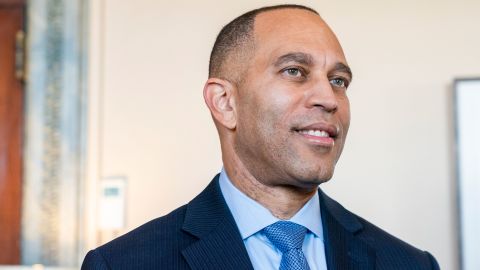Hakeem Jeffries to make history as the first Black lawmaker to lead a party in Congress
After the lengthy House speaker floor fight, the New York Democrat will likely lead the minority party. He would succeed Nancy Pelosi, who was speaker in the last Democratic Congress. He was the first Black member to lead House Democrats and the first born after World War II.
What happens in the House without a speaker?
After Pelosi, Steny Hoyer, and Jim Clyburn announced their resignations, Jeffries, 52, took over as Democratic leader. New Congress assistant leader Clyburn is expected.
House Democrats elected Jeffries in November. After Pelosi’s 20-year leadership, Democrats rallied around him. With Republicans having a small majority, Jeffries will likely lead the House Democratic minority for the next two years.
On Tuesday, the House failed to pick a speaker for the 118th Congress. Republicans nominated GOP leader Kevin McCarthy, Arizona Rep. Andy Biggs, and Ohio Rep. Jim Jordan on three rounds, but none received the 218 votes needed for the speakership. Jeffries, a Democrat, earned 212 votes, more than any Republican challenger but not enough to win.
Democrats rallied behind Jeffries Tuesday as Republican infighting thwarted a new speaker. Democrats chanted “Hakeem, Hakeem” and stood and applauded their future leader. Democratic won the first day of the speakership election with Jeffries leading McCarthy.
After several hours, the speaker election was adjourned Tuesday night and will resume Wednesday at noon: | Hakeem Jeffries
Once the speaker is elected and MPs are sworn in, a formal announcement of party leaders takes place — with Jeffries positioned to become minority leader at that time as Republicans would control the House majority in the new Congress. Jeffries still has a slim chance of becoming speaker if Republicans fumble the gavel.
Jeffries told reporters Tuesday he will not help Republicans pick a speaker.
“We are looking for a willing partner to tackle problems for the American people, not defend the Republicans from their dysfunction,” Jeffries added.
Also read: Nancy Pelosi
Jeffries was born in Brooklyn, New York, and studied political science at the State University of New York at Binghamton and obtained a master’s degree in public policy from Georgetown University. He also attended law school at New York University School of Law where he was on the law review.
He started his career in politics after being elected to the New York State Assembly in 2006. In 2012, he was elected to New York’s 8th congressional district, which encompasses sections of Brooklyn and Queens.
During his time in Congress, Jeffries has campaigned for policing reform, including a national ban on chokeholds following the murder of Eric Garner, a Black man who died in 2014 after being held in the restraining move. He was also essential in the passage of the First Step Act and co-sponsored the George Floyd Justice in Policing Act that passed the House but failed in the Senate.
Related News: Hakeem Jeffries elected as leader of the House Democrats – Net Worth and Earnings
In 2019, he became chairman of the Democratic caucus, making him the youngest member serving in leadership. Jeffries was also one of a limited group of members who were impeachment managers during the Senate trial of then-President Donald Trump.
Jeffries, who was first elected in 2012, will enter on his sixth term with hopes to reinstate the expanded child tax credit, get his party back to the majority in 2024, call out what he describes as Republican radicalism and improve economic access.
“I just look forward to the opportunity to do the most good for the largest number of people possible for as long as I have the opportunity to do so and can operate at the highest level,” he told CNN last month.
Jeffries ascending to become one of the highest-ranking Black politicians ever in America comes. As a record number of Black people assume their role in Congress. They will navigate the Capitol, making decisions for their citizens, in a structure where the foundation was laid by slaves.






